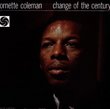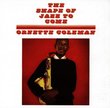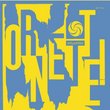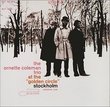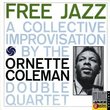| All Artists: Ornette Coleman Title: This Is Our Music Members Wishing: 1 Total Copies: 0 Label: Sepia Tone Original Release Date: 1/1/1961 Re-Release Date: 2/5/2002 Album Type: Original recording reissued, Original recording remastered Genres: Jazz, Pop Style: Avant Garde & Free Jazz Number of Discs: 1 SwapaCD Credits: 1 UPC: 655036000229 |
Search - Ornette Coleman :: This Is Our Music
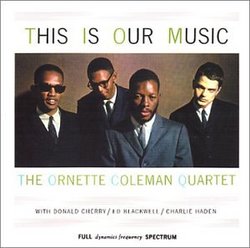 | Ornette Coleman This Is Our Music Genres: Jazz, Pop
Originally released in 1961, 'This Is Our Music' marked Coleman's third release for the label and certainly one of his finest. Sepia-Tone has newly re-mastered this important release, presenting it with the best sound qu... more » |
Larger Image |
CD DetailsSynopsis
Album Description Originally released in 1961, 'This Is Our Music' marked Coleman's third release for the label and certainly one of his finest. Sepia-Tone has newly re-mastered this important release, presenting it with the best sound quality it's ever had. The Ornette Coleman Quartet made music that was simultaneously radical and beautiful - 'This Is Our Music' is incontrovertible evidence. Similar CDs
|
CD ReviewsOrnette reunited with Ed Blackwell R. Hutchinson | a world ruled by fossil fuels and fossil minds | 07/08/2003 (5 out of 5 stars) ""This Is Our Music" is one of the essential discs Ornette Coleman recorded for Atlantic from 1959 to 1961, and the most important thing about it is that it reunites Ornette with Ed Blackwell for the first time on record. Blackwell was the first drummer to collaborate in making Ornette's music, and played a critical role, but was not able to play on the first several albums. Billy Higgins is a phenomenal drummer, and added something special of his own to "The Shape of Jazz to Come" and "Change of the Century," but Blackwell's New Orleans polyrhythms are documented for the first time with "This Is Our Music." As the story goes, Ornette, from Ft. Worth, was touring the South with an R&B band. Some locals objected to his innovative style, beat him up, and threw his tenor off a hill, leaving him stranded in New Orleans in 1949. He stayed with a friend's family for several months, borrowing his friend's brother's horn so he could practice while he tried to secure another gig. It was during that time that he met Ed Blackwell, and they played together as Ornette first developed his innovative style. Later in the mid-50s they were both in L.A., and played together, practicing Ornette's large and growing number of compositions, along with Don Cherry and Charlie Haden. It takes some effort to piece together the chronology of Ornette's recordings, and so here is the list of the Atlantic records (the first two on Contemporary, "Something Else!" and "Tomorrow Is the Question" were compromises, not featuring Ornette's regular band): The Shape of Jazz to Come -- recorded 5/22/59, released October, 1959 Change of the Century -- recorded 10/8-9/59, released June, 1960 This Is Our Music -- recorded 7/19, 7/26, 8/2/60, released February, 1961 Free Jazz -- recorded 12/21/60, released September, 1961 Ornette! -- recorded 1/31/61, released February, 1962 Ornette On Tenor -- recorded 3/22, 3/27/61, released December, 1962 Blackwell played drums on the last two dates, "Ornette!" and "Ornette on Tenor," and both Blackwell and Higgins played on "Free Jazz," with a double quartet. One of the tracks on "Ornette!" features a long Blackwell solo. Higgins, with a solid background in swing and bop, went on to play with many a jazz leader over the years. Blackwell was always associated with Ornette, playing with him later in the 1960s, and then forming "Old and New Dreams" with Don Cherry, Charlie Haden and Dewey Redman in the 1970s to play music that extended the Coleman Quartet in the direction of pan-African styles. Cherry and Blackwell made two excellent duet albums as well, "Mu" in 1969 (see my review) and "El Corazon" in 1982. Ed Blackwell, who suffered from kidney disease and underwent kidney dialysis for many years, died in 1992. Don Cherry died in 1995. Anyone who decides that they seriously dig Ornette's music should save up and get "Beauty Is a Rare Thing," a 6-disc box that contains ALL the Atlantic recordings, not only the 6 original releases, but all the additional tracks that were collected in the later "Art of Improvisers" (released in 1970) and "Twins" (released in 1971), as well as tracks that were released only in Japan and some that were never released in any form. The summer 1960 sessions with Blackwell that produced "This Is Our Music" include more rare and never-before-heard tracks than any of the other dates. (A warehouse fire in 1976 destroyed tapes of additional Atlantic sessions, perhaps twice as much material as was saved.) The 70-page booklet, with great black-and-white photos, includes a 28-page essay by Robert Palmer, which is my source for much of the above information. One further note to those interested in Ornette -- start with "Free Jazz" at your peril. It is the most difficult of his recordings, not his most successful, and should be heard only after hearing his fantastic quartet sessions. Personally, I recommend beginning with "The Shape of Jazz to Come" with Billy Higgins and "This Is Our Music" with Ed Blackwell. Peace." DO NOT FORGET THE FIFTH MEMBER... Jean-Jacques Rossatti | BRAZIL | 02/05/2003 (4 out of 5 stars) "There's Coleman, Haden, Cherry and Blackwell - it definitely sounds wonderful, ah? But there is also the underrated NESUHI ERTEGUN ruining the great music played by this group - this is definitely his worst producing job I have ever heard (out of MANY other horrible sessions - check out his 'cut-and-paste' approach on Mingus' 'Blues and Roots'...).I myself have got the 'complete-Coleman-atlantic' sessions and the sound of these sessions are 'audibly' worse than the others, far worse, so much that I can't really stand listening to this music, like many other absolute masterpieces (awfully)produced by Mr. ERTEGUN.R.I.P., Mr. Ertegun."
|

 Track Listings (7) - Disc #1
Track Listings (7) - Disc #1